Despite housing nearly 700 students this fall, the Mount Vernon Campus is the University’s only campus lacking a COVID-19 testing site.
More than 10 students living on the Vern said in interviews they are worried about the public health risks associated with symptomatic students traveling three miles on the Vex to the Foggy Bottom Campus to get tested. But officials and experts said given the high vaccination rates on campus, traveling from the Vern does not present a significant risk for coronavirus transmission.
Ray Lucas, the University’s COVID-19 coordinator, said officials have not traced any coronavirus cases back to exposures on the Vex.
He said officials are considering adding a coronavirus testing center to the Vern, but no immediate plans are in place. Students with symptoms should abide by GW’s mask mandate and take the Vex to get symptomatic testing at the Colonial Health Center in Foggy Bottom, he said.
“This is no different than general guidance from the health department as people with symptoms often need to leave their home for access to testing or other healthcare services,” Lucas said in an email.
Students said more frequent travel to Foggy Bottom to meet the University’s new biweekly coronavirus testing requirement has become uncomfortable and inconvenient.
Freshman Kailey Christensen, who lives in West Hall, said spending 15 minutes commuting on the Vex worries her while she sees other students on board coughing and showing potential symptoms for the coronavirus. She said students have continued to pack onto the Vex until the vehicle reaches maximum capacity, even when riders are visibly symptomatic.
“When people are on the bus and they’re coughing and it’s really crowded, it makes me a little bit scared,” Christensen said. “There’s been a few people in my dorm who’ve had COVID, and they’ve been quarantining, and they had to come here to get their COVID test, so I feel like they’re just spreading it to other people.”
Charlotte Elburn, a freshman living in West Hall, said she traveled to Foggy Bottom two weeks ago to get a test because she had a cough and sore throat.
Though she tested negative, Elburn said she was worried about exposing others to the virus on the Vex before receiving her results, often sitting within three feet of other commuters.
“When I had to go to Foggy, I had to be on the Vex where it’s really crowded, and I double mask, but there is no telling if you’re going to end up sitting right next to someone, and it was hard to not cough in the public area,” Elburn said.
Professors who teach on the Vern said students should not have to risk exposure to the virus to use transportation between campuses.
Mark Ralkowski, an associate professor of philosophy and honors who teaches on the Vern, said after commuting on the Vex for 10 consecutive school years, he decided to drive or bike to Foggy Bottom this year as long as the Vern lacks testing.
“This is the only year that I will not ride it, as long as we’re not testing on the Vern,” Ralkowski said. “I wish that every person could make that choice, but we have a lot of folks – students, hundreds of them – who are not in that position.”
Ralkowski said academic leaders on the Vern, like the directors of the Honors Program, the Women’s Leadership Program and the University Writing Program, have been requesting on-site testing on the campus since this summer.
“The request has been made over and over again and has not been met,” Ralkowski said.
Jennifer Bertolet, a professor of history on the Vern, said implementing testing on the Vern would also decrease the heightened demand that students said has limited access to testing appointments on the Foggy Bottom campus this past month. Officials expanded testing availability in recent days, creating a standby line for asymptomatic tests and preparing to offer weekend appointments for symptomatic patients.
“It would definitely make things easier and more convenient for students on the Vern, and it would probably lighten the testing load at Foggy Bottom as well,” Bertolet said.
Experts in public health said it’s unlikely that students will contract coronavirus while riding the Vex considering the biweekly testing requirement and the high vaccination rate on campus.
Aimee Palumbo, an assistant professor of instruction in epidemiology and biostatistics at Temple University, said travel on the Vex between GW’s campuses does not pose any public health risks considering that 97 percent of GW’s student population was vaccinated as of Sept. 15.
“Given that context, it’s unlikely that any given shuttle or bus is going to have a great deal of unvaccinated people, so a couple of unvaccinated people on any bus traveling for 15 minutes with others when they are masked and often just sitting quietly is not cause for concern,” Palumbo said in an email.
The University faced a spike in coronavirus cases with a daily positivity rate of 2.91 percent earlier this month, but cases have since subsided.
Gerald Keusch, a professor of medicine and the associate director of the National Emerging Infectious Diseases Laboratory at Boston University, said the Vern doesn’t need to have its own lab to process tests.
“If the testing is done on the campus in D.C., presumably where the labs are, your shuttle system can carry your samples to it rather than having students bring their nose to it,” Keusch said.








